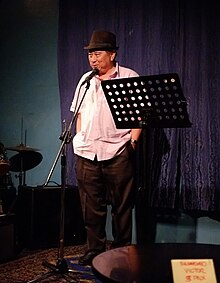Virgilio S. Almario
Virgilio Senadren Almario | |
|---|---|
 Virgilio Almario at a poetry reading in June 2011 | |
| Born | 1944 March 9 Camias, San Miguel, Bulacan |
| Pen name | Rio Alma |
| Occupation | Poet, literary critic, lecturer, editor |
| Language | Filipino |
| Nationality | Filipino |
| Alma mater | University of the Philippines |
| Literary movement | Philippine Modernism |
| Notable awards | Philippine National Artist, University of the Philippines Centennial Award, Amado V. Hernandez Award, Balagtas Award for Poetry and Essay |
| Spouse | Emelina B. Soriano |
| Children | Asa Victoria, Ani Rosa, Agno Virgilio |
Virgilio Senadren Almario, better known by his pen name, Rio Alma, is a Filipino artist, poet, critic, translator, editor, teacher, and cultural manager.[1] He is a National Artist of the Philippines.
Growing up in Bulacan among peasants, Almario sought his education at Manila and completed his degree in A.B. Political Science at the University of the Philippines.
His life as a poet started when he took master’s course in education at the University of the East where he became associated with Rogelio G. Mangahas and Lamberto E. Antonio.
A prolific writer, he spearheaded the second successful modernist movement in Filipino poetry together with Rogelio Mangahas and Teo Antonio. His earliest pieces of literary criticism were collected in Ang Makata sa Panahon ng Makina (1972), now considered the first book of literary criticism in Filipino. Later, in the years of martial law, he set aside modernism and formalism and took interest in nationalism, politics and activist movement. As critic, his critical works deal with the issue of national language.
Aside from being a critic, Almario engaged in translating and editing. He has translated the best contemporary poets of the world. He has also translated for theater production the plays of Nick Joaquin, Bertolt Brecht, Euripedes and Maxim Gorki. Other important translations include the famous works of the Philippines' national hero, José Rizal, namely Noli Me Tangere and El filibusterismo. It was deemed as the best translation by the Manila Critics Circle.
Almario has been a recipient of numerous awards such as several Palanca Awards, two grand prizes from the Cultural Center of the Philippines, the Makata ng Taon of the Komisyon sa Wikang Filipino, the TOYM for literature, and the Southeast Asia Write Award of Bangkok.
He was an instructor at the Ateneo de Manila University from 1969-1972. He only took his M.A. in Filipino in 1974 in the University of the Philippines. In 2003, he was appointed Dean of the College of Arts and Letters in the said university. On June 25 of the same year, he was proclaimed National Artist for Literature.[2]
Almario is also the founder and workshop director of the Linangan sa Imahen, Retorika, at Anyo (LIRA), an organization of poets who write in Filipino. Award-winning writers and poets such as Roberto and Rebecca Añonuevo, Romulo Baquiran Jr., Michael Coroza, Jerry Gracio, and Vim Nadera are but some of the products of the LIRA workshop.
He was a founding member of the Gallan sa Arte at Tula (GAT), along with fellow poets Teo Antonio and Mike Bigornia.
Works
Poetry Collections
- Taludtod at Talinghaga. (1991)
- (A)lamat (H)istorya. (1985)
- Palipad-Hangin. (1985)
- Katon Para sa Limang Pandama. (1987)
- Ang Hayop na Ito. (2004)
- Sentimental. (2004)
- Sari-Sari. (2004)
- Estremelenggoles. (2004)
- Memo Mulang Gimokudan. (2005)
- Dust Devils. (2005)
- Sonetos Postumos, book of poems with translation by Marne Kilates and paintings by National Artist Ang Kiukok. (2006)
- Tatlong Pasyon sa Ating Panahon, poems for children with illustrations by Mark Justiniani, Neil Doloricon, Ferdinand Doctolero. (2006)
- Buwan, Buwang, Bulawan. (2009)
References
- ^ UP Newsletter; 4 April 2008; Volume xxviii Number 03
- ^ Biography - RioAlma.com http://rioalma.com/about/ retrieved at August 27, 2009, 10:39PM

